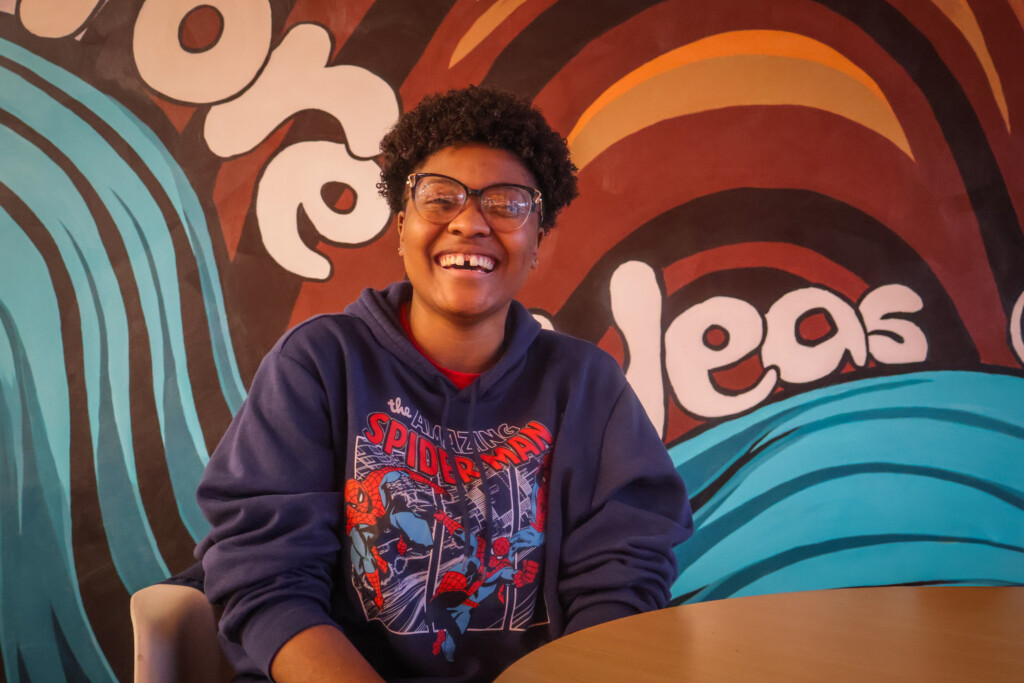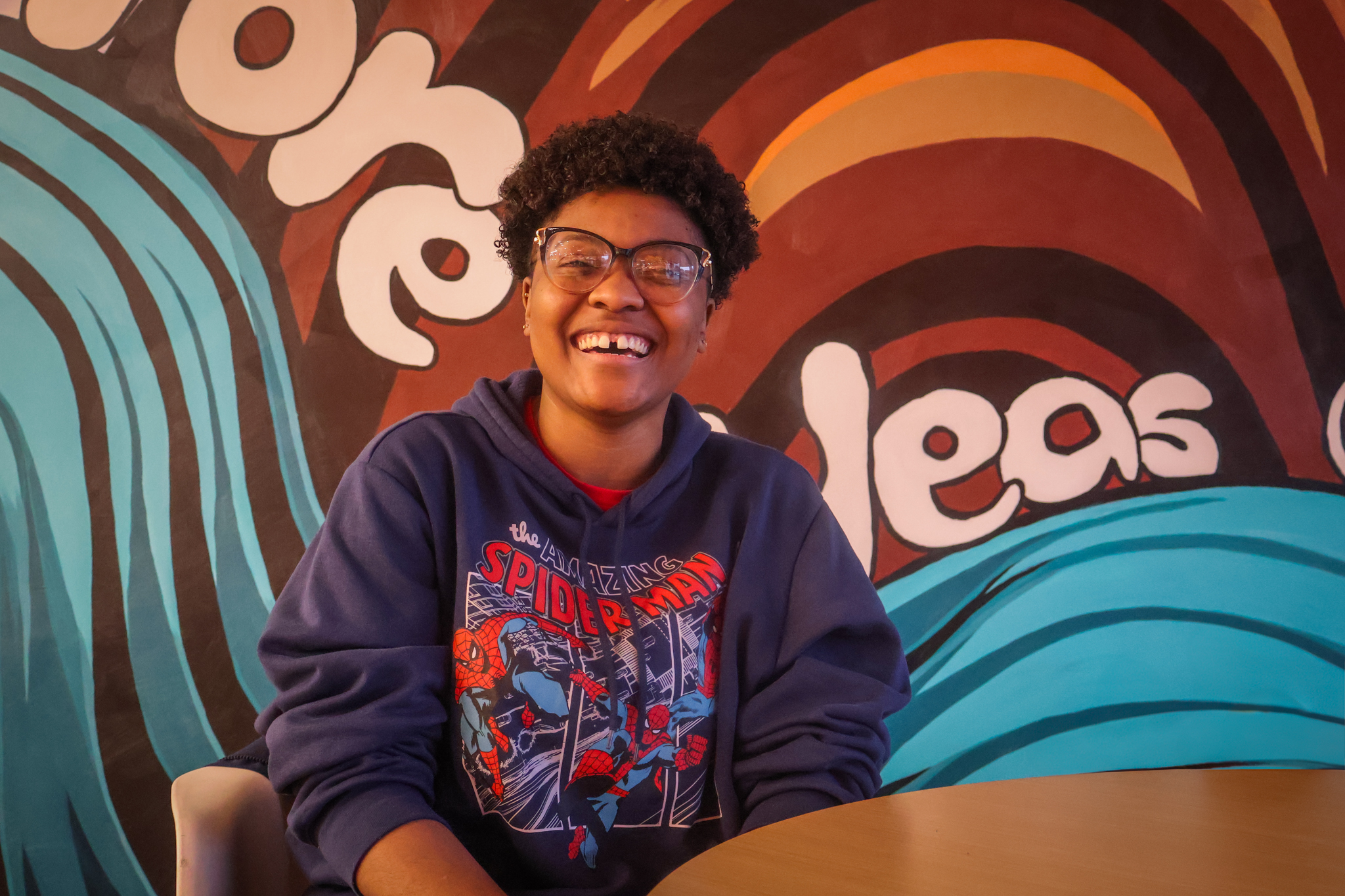Senior Kendal Jordan has been involved with research on campus since her freshman year, working on several projects almost all centered on the same topic: video games.
“I never leave video games,” she said. “I always bring them with me, somehow, some way.”
Jordan first became involved with studying video games after taking Video Games & Play, a Writing 105 class, during her first semester at UR. At first, Jordan said she felt a disconnect between herself and the topic, which made the class difficult.
“Everyone in the class played video games, but I watch video games— I’m a chronic video game watcher.” Jordan said. “Then [Professor Kristana Textor] was like, ‘Connect [your writing] to something you’re interested in.’”
For Jordan, this was psychology. Her work eventually developed into a paper titled “The Psychological Effects of First-Person Shooter Games.” After finishing the semester, she brought her research outside of the classroom to Breaking Boundaries with Video Games, an annual half-day conference at UR.
“I presented [the project] there first, and then from that, I kind of kept going with more research in video games,” she said. Though she later revisited first-person shooter game research at the end of her junior year, Jordan soon began another project focused on Black characters— or rather, the lack thereof— in video games.
Her project, “Unveiling the Pixels: A Critical Analysis of Black Representation in Video Games,” was inspired by “Jim Code,” a term penned by Princeton professor Ruha Benjamin. Jim Code is the idea that within the heart of computer technology lies a deep-seated discrimination against people of color— for example, generative AI perpetuates racist stereotypes by associating incarceration with Black people rather than people of any other race.
Jordan also took inspiration from specific video game characters and their stories to form her project. Barret Wallace, a character in “Final Fantasy,” is one of many Black video game characters whom Jordan said represent stereotypes of “dark-skinned men and women [being…] more aggressive.” She also took inspiration from “Resident Evil” character Sheva Alomar, who, being a light-skinned Black woman, represents the rare case of a Black main character who doesn’t die in the game.
“[There is a trope] where Black characters die for the plot of white characters,” Jordan said. She said examples of this include multiple Black characters from “The Last of Us” in both television and downloadable content (DLC) forms dying in order to save the white main character, Ellie, or even simply to teach her some sort of life lesson. “Very much not fun and fresh.”
Inspired by the stories of these characters, Jordan created a metric to gauge Black representation.
“The metric analyzes intellectual depth, cultural identity, dynamics, and narrative impact,” Jordan said.

Kendal Jordan said she has always been interested in psychology. “I came into school as a History and Psychology double major. Never took a history class. It’s hilarious, I know,” she said. She will graduate with a Psychology and Brain and Cognitive Science double major and an American Sign Language minor in May.
Although Jordan said the research is necessary in order for improvement, she emphasized its difficulty.
“All jokes aside, it truly sucks,” Jordan said. “I put this research on hold because it makes me think about my identity in ways I didn’t think about before. Like, I’m tying these video games to slavery, I’m tying them to the idea that we [Black people] are always the other, always monsters. And I see these characters, and they either turn to monsters or they die before they get the chance.”
That is, when Black characters are included in video games in the first place.
“Looking at Black representation in games, it literally started ten years ago.” Jordan said. “So it’s literally been a decade. Video games have been around since the 1980s. But they just realized, ‘Oh, maybe we should put representation in our stuff!’”
Jordan presented this project at UR’s Undergraduate Research Symposium in her junior year spring and won what she calls “a silly little award” but was actually the Dean’s Award for Oral Presentation. She described how, on the day of the poster session for the symposium, she was running around campus since she had an event for her American Sign Language class.
“I go back downstairs [after the event to the symposium] and they’re like, ‘Kendal, we missed you!’” Jordan recounted. “They said [to me], ‘They called your name and you won an award!’ I said, ‘Huh?’ Because of course, I’m not thinking in English.” After receiving the award, Jordan said she “sat there and cried like an iPad kid.”

Kendal Jordan, pictured, said that, because her research is interdisciplinary, it can be hard for others to understand. She has received criticism for her research because the topic is “too broad” and should be “funnel[led] down.” She isn’t perturbed by this, though: “I don’t fit in categories,” she said, “through life and through research.”
In order to match her research to the topic of the conference, she expanded on her project by looking through a new cultural lens.
“I started looking at different cultures: I call them gun vs. non-gun cultures,” Jordan said. She classifies Japan as a country with a “non-gun culture” due to strict firearm laws, such as requiring hunters to take a class and pass a test to receive a permit to use a gun. She classifies the US, however, as having “gun culture.”
“I’m gonna be honest with you, this research actually hurts,” Jordan said, reflecting on studying the US’s gun violence.
When comparing cultures, Jordan also noticed differences in how Japanese people at the conference interacted with her as a Black woman. She said she experienced isolation and was one of two Black people involved in or attending the entire event.
“Nobody from Japan talked to me this entire conference. They would look at me, wouldn’t say anything. Even with the language barrier, I would still try to reach out, but no one would talk to me,” she said. “I was the only Black person to present. It was the most lonely conference I’ve ever had in my entire life.”
But despite these experiences, she said she still values her involvement in the conference and the opportunity to share her work.

From left, Kendal Jordan stands with mentor Kristana Textor at Replaying Japan, the 12th International Japan Game Studies Conference, at the University of Buffalo in August 2024.
Currently, Jordan is conducting research in the archives of the Strong National Museum of Play in downtown Rochester.
“At the Museum of Play, I’m looking at representations of marginalized identities: disabilities, sexuality, race, gender, and I think ethnicity, but I’m not sure yet. I’m literally playing video games and reading books they have in the archives,” she said.
Jordan is also working in a neuroscience lab as part of her honor’s thesis for psychology, studying the effects of Virtual Reality video games on a person’s ability to pick out objects from a crowd. She doesn’t enjoy this type of research as much as her past projects, though, as she considers herself a “theoretical video game researcher,” which means she “researches people’s games and then looks at [them] through different approaches.” In the future, she hopes to continue this sort of research— involving video games, hopefully— in the humanistic social sciences.
As a graduating senior, Jordan said she is proud of what she has accomplished in her time at Rochester.
“I think I did what I could in four years,” she said, noting her course overloading, extracurricular activities, and research.



